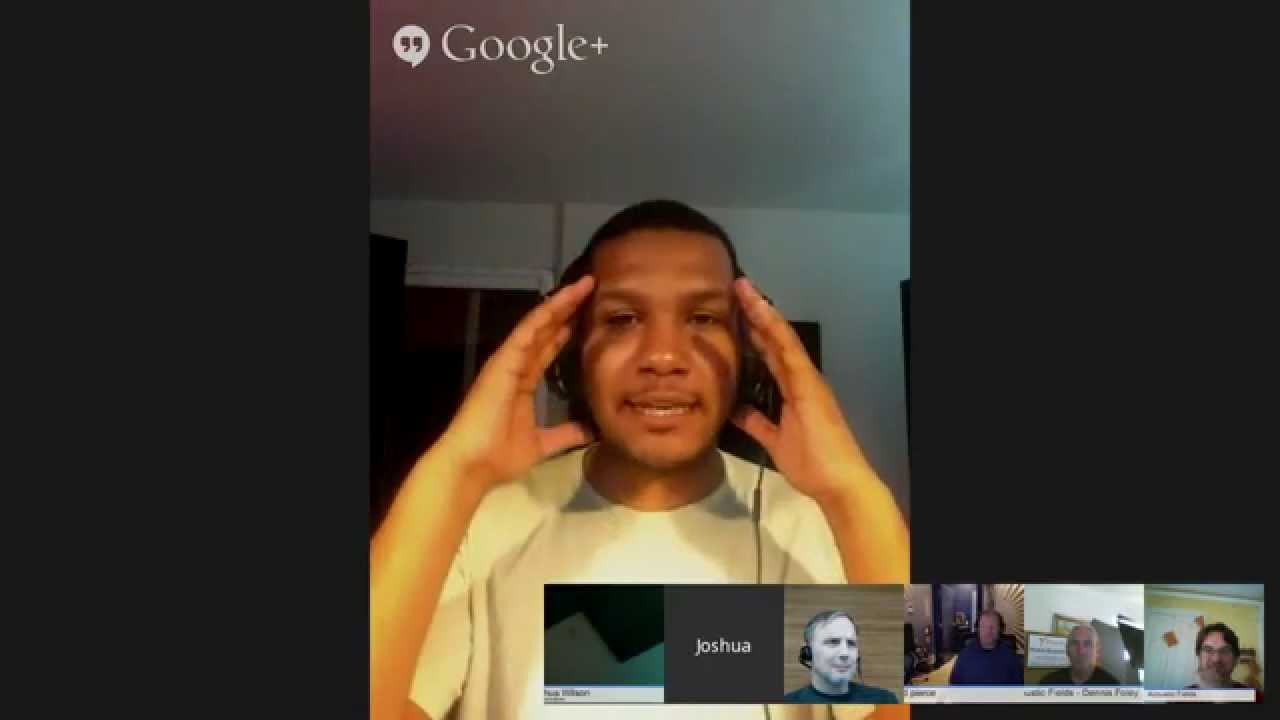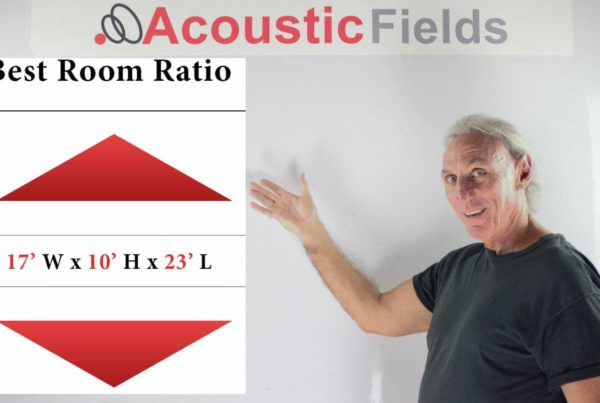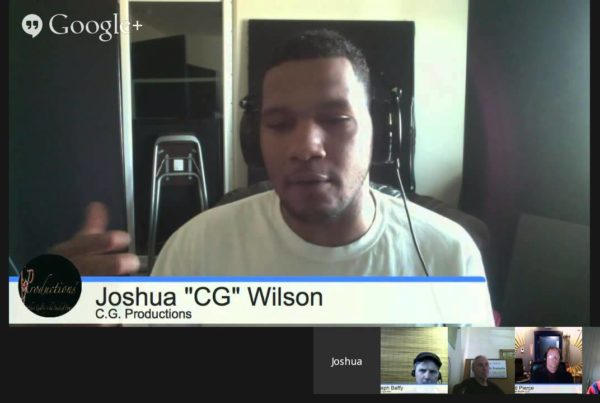In a recent Google Hangout I got together a bunch of experienced and talented audio engineers to help bridge the gap between what you are hearing as an engineer and how the room is causing that problem. We tried to cut through some of the confusion between “mix sound” and “room sound”. The following video and transcript comes from one particular section where we addressed the question “Are room acoustic problems consistent in your mixes?”. If you would like to see the full hour and a half discussion you can see the video further down the page.
Brad Pierce (BP): Well Joshua what do you think about this scenario: If you’re mixing in a room and you take that mix and you experience it on other playback systems in different rooms, you notice that similar issues arise in those other rooms that when you come back to your original mix room, you hear it and you will go back and rectify the issue. But would you say that those issues are consistent?
Joshua Wilson (JW): I think it really depends on the frequency range that you’re working in. So say you have a bass-heavy song and it’s going to be different from the way something that’s not bass-heavy will sound. So your mix is going to be different because of what you’re hearing and it’s always going to be like that. If you’re in an environment so long your ears adjust to the environment and if you go to a different environment you’re going to hear something different. It may be that little thing but then you come back to the environment then you can hear in that environment that’s where you start to make your adjustments to how it should sound. So that it sounds the same in each room.
BP: But what do you think about the mix rooms affects? Do you think the room is interfering with your judgment of what’s really going on, what’s really being recorded or played back, the actual thing that’s their once it’s out into the room, the room interferes with it so your perception is different. So when you take it to other rooms to analyze those interferences become relevant or show up. What do you think about that?
JW: I think what happens is you just find that happy medium. So in a room that’s not the best, all you can do is find that happy medium.
Joseph Baffy (JB): You mean by a happy medium you mean you find a work-around? You’re going to work-around your problem even if you don’t know the problem exists?
JW: Yeah exactly. I’ve done music in this room and most of the time I just take it to my car and see how it sounds and a lot of times I don’t have a lot of bass heavy but from where I sit I don’t hear a lot a bass in my listening position. I don’t hear the bass like I do in the car. But say if I sit in the position where my customer, my clients sit in the chair in the back, you can hear that bass. So because there’s a lot of things wrong with the environment that I’m in and I have to take that into account and sometimes I have to sit there and listen where the clients listen to make sure that it’s going to translate well outside of this room.
BP: So in a way with proper treatment in the room that you’re mixing in you might have less issues like that?
JW: Oh of course. Yeah.
Dennis Foley: Let me ask you guys this, if you record something in your rooms and you take to another room and you play it back is the difference you hear in sound, room sound?
JB: Yes.
BP: I find it’s fairly consistent and that’s how I manage my alterations when I’m in the control room. I know it’s going to be like this when I get out into the world so I can make adjustments and I can fine tune to compensate. Of course with better acoustic treatment I wouldn’t have to do that, I could just hear the truth and then I would know when I go out into the world it would be the truth instead of having to make those small adjustments, frequency balance wise.
JW: And that’s the thing, listening to music in Dennis’s studio is totally, completely different from listening to music anywhere else. When you don’t have to think, when your ears don’t have to adjust to anything and you just hear the music. its a totally different experience. Like my ears, actually I sat in Dennis’ studio for maybe around 8 hours and when I left my ears were completely retuned. Now they’ve adjusted back to this room but even when putting in treatment your ears are going to adjust to the room again. So you’re still going to have to relearn how to mix in that room, even though it’s better, you’re going to start getting better results because you’re going to be able to just relax and be able to feel “Okay what I’m doing is true”.
But at the same time every engineer has a different mix so the way that you may want your room, someone else may come in and not be able to mix in that environment. Not the same as you do because you’re going to tune that room to how you feel you get your mix perfect and so if you still have to readjust to the room even with treatment, you’re still going to get a better mix because there’s going to be a lot of things you’re not going to be hearing right now and with treatment your ears are going to relax and then you’re going to be hearing more detail.
You know as engineers you shine the focus on sound so say you’re listening to, and I’m pretty sure it’s happened to both you guys, you listen to the mix and somebody comes in or somebody is doing something and they’re making some little noise and because you’re so tuned in to frequency the stuff that you’re hearing, that little noise, and you’re like “What the fuck is going on right now?”.
And that’s the thing, it’s just when you’re able to relax and tune in like that your mixes are going to come out way better because you can get deep into the details without strain, you’re not actually straining, you’re really listening. Your ears aren’t compensating for anything, you’re really listening to what it is that you’re doing.
AD: If I may jump in, what I found because I went to Dennis’ studio as well and I’ve been in a number of great studios in the UK and it felt like it was like having a big tapestry, canvass and you could literally paint where you wanted the sound. You know what I mean? It was like “I’m going to put the reverse guitar here”, paint a dot “I’m going to have this sweeping horn going here”.
JW: You could definitely hear subtle movements in the instruments. Dennis likes to mood it out, like he just takes off the lights but what that does is gives you more of a visual image than listening. It’s almost like you could see the instruments instead of listening. It’s weird, it’s hard to explain, it’s one of the things you really have to just experience because just a lot of things come into account when you’re in that room. Your feelings actually come into a play with what you hearing. It’s still something you really have to experience.
BP: Joshua did you hear any of your own mixes in that room?
JW: Yeah I went in and I told Dennis that I hate every mix that I got! I told him I hated every mix.
BP: How do you think listening in Dennis’ room compares to listening to those mixes out in the world, in the car, on the boom box, that type of thing, ear buds, whatever?
JW: Well like I said you have to get a happy medium and the thing is it’s like you can still have a sound like music that’s listenable and enjoyable without it being the best but as engineers who are going to be perfectionist and a mix is never done, so when you hear it in a different environment and that you hear like “Ah man, I should’ve done this or I should’ve done that”. But the thing is what you have to understand is that listening environment isn’t normal, that is not your typical listening environment. I mean you’re putting it in a super room.
So normal everyday, like you’re going to be listening to in a house, nobody’s going to have a specific set-up like that. You could go listen to other people’s music that you’ve listened to and be like “Aw this mix is great” and listen to it in Dennis’ room and be like “Ah they should’ve done this” you know what I mean, it’s not a normal environment. If you could mix in that environment, you’re mixes are going to come up amazing because you’re hearing everything, everything but there are some mixes that you hear, they’re like “these mixes are really good” and you hear it in that room and that’s the thing like in the interview that me and Dennis done, I was saying that we’re naturally used to hearing the room and we naturally adjust for it and a lot of times we don’t even think about it because say we’re so focused into music, you don’t even think about it.
But when you listen in that room it’s like you realize there’s something that’s not happening and what’s not happening is you’re not hearing the room come back at you. All you’re doing is hearing the sound and that’s where it connects to you on the emotional level because… it’s really, really, really hard to explain that kind of experience like you don’t, you can’t explain how that sounds. You have to really experience it.
In your room you still hear the room, you know where your walls are and in Dennis’ room you don’t, you can’t, your perception of space is completely different. Like I said it’s like a super madness, you can’t, it’s really something you have to experience. It’s definitely another level man.
If you would like to learn more about room acoustics please sign up for my free videos and ebook by joining the mailing list here. I send room tuning tips and things for you to test in your room every Wednesday. They are easy to follow and really help you enjoy more of your music. And if you would like your room acoustic issues analysed for free by me then please fill in the form here and I will be happy to take a look for you.
Thanks and speak soon
Dennis







